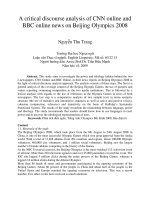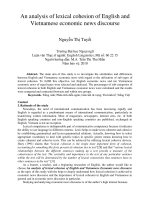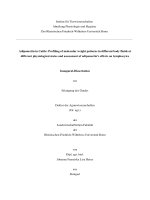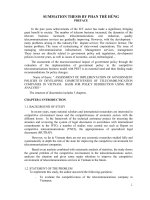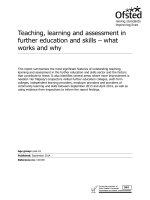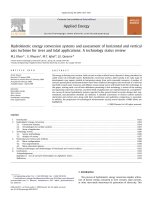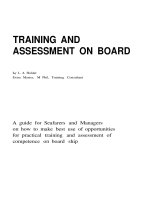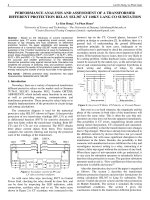Translation Analysis and Assessment U2 News Translation Assessment 2
Bạn đang xem bản rút gọn của tài liệu. Xem và tải ngay bản đầy đủ của tài liệu tại đây (581.75 KB, 18 trang )
ENG3061 Translation Analysis and Assessment
U2 News Translation Assessment [2]
Thu Ha Ngo
Division of Translation and Interpreting
Things to nail…
House keeping
Skopos Theory and News Translation – wrap up
Case study: Headlines Translation and Assessment
House-keeping
ST: “The problem is that China has now committed herself,
publicly, to sovereignty of the South China Sea and to push
that back, if only to the status of a claim that is not enforced,
is going to be very difficult.”
(comment by scholar Arthur Waldon of Pennsylvania
University, AP 8 Aug, 2010)
TT: “Việc Trung Quốc tun bố chủ quyền đối với tồn bộ
biển Đơng sẽ ngày càng khó khăn hơn.”
(Source:VnExpress.net, 9 Aug, 2010)
ST: “The problem is that China has now committed herself,
publicly, to sovereignty of the South China Sea and to push
that back, if only to the status of a claim that is not enforced,
is going to be very difficult.”
(comment by scholar Arthur Waldon of Pennsylvania
University, AP 8 Aug, 2010)
TT: “Việc Trung Quốc tun bố chủ quyền đối với
tồn bộ biển Đơng sẽ ngày càng khó khăn hơn.”
(Source:VnExpress.net, 9 Aug, 2010)
Vấn đề ở đây là Trung Quốc đã công khai tuyên bố chủ
quyền đối với vùng biển Đông và để lật ngược được
tuyên bố đó, cho dù đó mới chỉ là một tun bố „sng‟
thơi, cũng sẽ rất khó khăn.
Skopos Theory and
News translation
Translating news = transferring from the way of writing
news in SL to that in TL
Each paper has its own targeted readership
One piece of information = different presentations
A variety of translatum
A popular procedure
Rearrangement
Omission
Addition
Based on the significance of the ideas to the targeted
readership
show the viewpoint/attitude of the editor
Clarify / provide background knowledge (i.e. proper names,
cultural items)
Replacement
Simplify (i.e. numbers, data)
Activity 3
Comment
on the translation (and
perhaps, the translator(s)) applying
the Skopos Theory
When Duong was 10, her rambling French colonial family home in the
centre of Hanoi was confiscated by the government. "They accused us
of being capitalists because we had a big house. We were thrown on to
the streets." Four years later, in 1988, their situation was so unbearable
that Duong and her father, a former Vietnam People's Army soldier,
joined the ranks of so-called boat people trying their luck at a better
life elsewhere. "We paid a fortune for places on a fishing boat to sail to
Hong Kong. The boat's capacity was 20 people and there were 72 of us
packed on board. We didn't know if we'd live or die." Storms and piracy
were terrifying hazards: a boat that left at the same time as theirs didn't
make it, Duong says. […]
Still, they arrived in Hong Kong too late. Official resettlement
programmes for Vietnamese refugees had already ended. Duong and her
father spent the next five years there living in limbo in a barbed-wire
compound. "It was like a prison," she says. "There was no privacy, and at
shower time we were hosed down with disinfectant like pigs." Unable
to prove they were political asylum seekers, they eventually returned to
Vietnam when she was 19.
(excerpt from From war babies to billionaires: Vietnam's wealthiest
women by Abigail Haworth on The Guardian UK, 24.03.2013)
Thuộc thế hệ 7X, Alan Dương cũng đã trải qua những
ngày khói đạn của chiến tranh Việt Nam. Cha cơ cũng
từng tham gia vào Lực lượng Quân đội Nhân dân Việt
Nam. Bản thân cô cũng hiểu nỗi thống khổ của người
dân Việt sống trong cảnh mưa bom đạn, cái chết rập
rình.
Tuy nhiên, năm 14 tuổi, Alan Dương may mắn được ra
nước ngồi học và trở về nước ở tuổi đơi mươi với khả
năng tiếng Anh nổi trội. Alan Dương đã làm việc cho một
công ty động sản tại Hà Nội với cơng việc chính là tư vấn
nhà ở cho khách hàng người nước ngồi.
(Trích từ Báo Anh ca ngợi ba nữ tỷ phú giàu nhất Việt Nam đăng
trên Tienphong.vn, ngày 25.3.2013)
Skopos Theory and Code of Ethics
Translate news = rewrite news
Bio-Break
Case study: Headlines Translation
Some rules (English headlines)
Avoid using to be: is, are, was, were
Avoid using articles: a, an, the
Avoid using and
Use present simple tense even for the Past
Use to V to refer to the Future
Use non-to infinitive Verb for Active Voice; past participle for
Passive Voice
Avoid using jargons, technical terms
Short, concise
Simple (to understand)
Informative
Further Exercise
Analyse and Rewrite the English headlines
Translate English headlines into Vietnamese ones
Find an English article. Translate it using Skopos Theory
and formal equivalence theory.
Compare two versions.
